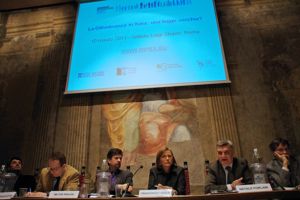“Italian Citizenship: an out-of-date legislation?” – launch event of MIPEX III in Rome
On the 10th March 2011, Fondazione ISMU and British Council organise in Rome a debate on the MIPEX entitled 'Italian Citizenship: an out of date legislation?'.
MIPEX III is the largest study regarding EU legislation on immigration. It measures and compares integration policies in all EU Member States, Norway, Switerland, Canada and the USA. MIPEX III is an important instrument for reflection and study and a useful tool for politicians, academics, civil society and the media to examine new practices and policies. Italy's policies are included in this study and today's debate proposes to discuss one of the 7 policy areas, access to nationality: a sensitive but highly topical theme.
The legislation passed in 1992 on nationality was already out of date. It is the legislation of a country of emigration where the attention is focussed on how to maintain a relationship between emigrants and their descendants and the homeland. This explains the choice of the jus sanguinis and the slight attention paid to the theme of access to nationality by persons who do not have direct Italian ascendancy. In particular, it does not even consider the possibility that nationality legislation could be a means for integration and not just a formality.
Instead, today, after 20 years of mass immigration, there is the problem of substantial immigrant integration and it poses the question on how nationality legislation can contribute to this end. Even taking into account the experience of countries with a far longer history of immigration one questions how much weight should be given to the right of nationality for those born on national soil, to school attendance, to language fluency, and to the basic knowledge of civil and institutional law. It is not just a case of rethinking what is necessary for an accessibilty which can also sustain an aware citizenship, but, even before, to rethink it in the light of proposing to immigrants a model and a pattern for integration. Certainly, integration cannot depend only on citizenship law, but if we think about, for example, the experience of the US with its test and solemn oath, we can see a true and proper rite of passage which takes on a strong value in the story of the immigrants who become citizens of the United States.
Within this context one puts and must read, beyond the contingent political controversies and the too easy schemes which oppose goodness to harshness/severity, openness to closure and so on, the current political and cultural debate on citizenship.
Source:
Italian Citizenship: an out of date legislation? - http://www.migpolgroup.com/events_detail.php?id=252
La Cittadinanza in Italia: una legge vecchia? - http://www.ismu.org/upload/files/20110304015224.pdf
Veni, Vidi, Naturalizzati? - http://www.mipex.eu/blog/veni-vidi-naturalizzati#more-55
Studio MIPEX III: L’Italia in ritardo su partecipazione politica e cittadinanza - http://www.secondegenerazioni.it/tag/scuola/



